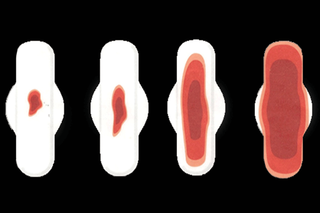
Heavy Menstrual Bleeding Can Be a Symptom of Undiagnosed Hemophilia
Yes, women can have hemophilia too, and sadly, it primarily manifests as heavy periods. Who knew?

About 30% of women, worldwide, report heavy menstrual periods. Of these, 15% have an underlying bleeding disorder. However, most of these women go undiagnosed, which leaves them with a problem that is actually treatable, Paula James, a hematologist at Queen’s University in Canada, writes for The Conversation.
These disorders, writes James, can be classified as von Willebrand disease or hemophilia, but women often wait up to 15 years before getting appropriate testing, diagnosis, and treatment, mainly because they don’t know what constitutes an unusually heavy period. Thisdelay increases their risk of acute hemorrhages that ultimately end up in blood transfusions, and in some cases, hysterectomies.
Both von Willebrand disease and hemophilia are inherited and are caused by low levels of blood-clotting factors. Thus, the diseases primarily affect the body’s soft tissues, and patients can suffer complications including frequent and severe nose bleeds, extremely heavy menstrual periods and bleeding gums.
Related on The Swaddle:
The Overlooked, Little Understood Condition Often Mistaken for PMS
Although the incidence of von Willebrand disease is low in India, compared to in the West, hemophilia is more common. Estimates suggest up to 80% of people who have hemophilia live in developing countries; in India, experts believe roughly one in 5,000 people have the condition. Yet, according to the most recent survey published by the World Federation of Haemophilia, with data provided by the Haemophilia Federation of India, only 13,448 patients are registered, acknowledging that there is a lack of diagnosis.
So far, James writes, hemophilia was thought to affect only men, while women were thought to be carriers of the genetic mutation that causes the condition.
“Women who are carriers of hemophilia are very often considered to be ‘only carriers’ — capable of passing on the mutant genes to their children. They may be told this by their doctor. Their bleeding often then goes untreated because of this misconception,” James writes.
However, she adds, “My own research has shown that around 30 to 40% of hemophilia carriers experience abnormal bleeding including heavy periods, post-partum hemorrhage and joint bleeds. Some, but not all, have low clotting factor levels.”
Therefore, many organizations like the World Federation of Hemophilia are now focused on increasing public knowledge about bleeding disorders and awareness that women can also have hemophilia.
Still, in most cases, the disorder gets missed because in families with a bleeding disorder, women don’t realize that their period is unusually heavy because other women in the previous generations may have always bled heavily.
Related on The Swaddle:
Your Menstrual Cycle Keeps Changing Throughout Your Lifetime
“Other issues that make it difficult to identify the problem include social stigma against discussing periods openly and also lack of awareness about what constitutes normal and abnormal periods,” says Dr. Vidya Shah, a gynecologist with Mumbai’s Motherhood Maternity Clinic.
To identify an unusually heavy period, both James and Shah say that some signs include changing pads or tampons every hour, suffering from an iron deficiency, frequently soaking the sheets at nights and bleeding that lasts longer than a week.
To identify a bleeding disorder, iron deficiency or unusually heavy periods are the first giveaways, but they are the ones often ignored.
Other symptoms in women could include bruising easily, experiencing prolonged bleeding after surgery and trauma or heavier postpartum bleeding.
A bleeding disorder is easily treatable, says Dr. Shah. Doctors may prescribe contraceptive pills that thin the uterine lining, or endometrium, and thus lighten bleeding. Additionally, they may also give medications like tranexamic acid and desmopressin, which aid clotting. James also adds that hormonal intrauterine devices (IUDs), which like contraceptive pills reduce the thickness of the endometrium and lighten period flow, may also be prescribed.
Many carriers of the genetic mutation that causes hemophilia do experience symptoms of the condition, but some women live with their symptoms for years without ever being diagnosed, or even suspecting a bleeding disorder. “Education and awareness-raising is the only way we can close the gap in this care,” says Dr. Shah.
Anubhuti Matta is an associate editor with The Swaddle. When not at work, she's busy pursuing kathak, reading books on and by women in the Middle East or making dresses out of Indian prints.
Related


Study: Denying a Woman an Abortion Can Have Long‑Term Physical Effects
